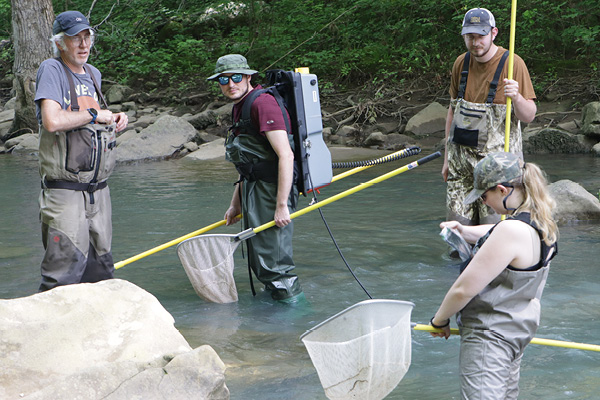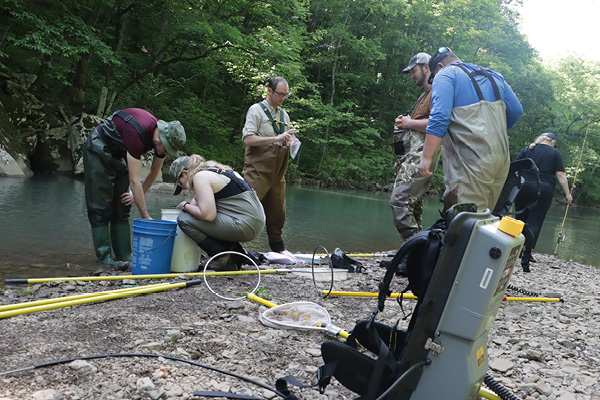
(Photos courtesy of Russell Jones, instructor of broadcast/video/multimedia storytelling)
A group of University of the Ozarks faculty and students are taking part in a coordinated, multi-year research project that is examining the effects of an event that hasn’t occurred since Thomas Jefferson was president of the United States.
The event is being called the Great Southern Cicada Emergence. The research project is examining the impacts of two broods of periodical cicadas — brood XIII, a 17-year brood that is emerging in Iowa, and brood XIX, a 13-year brood emerging in Illinois, Missouri, Arkansas and east of the Mississippi River drainage. This type of double brood emergence event hasn’t happened in the same region since 1803.
Faculty and students from U of O are working with faculty and students from several other universities throughout the region to study if this periodical cicada emergence is impacting fish ecology of river and stream fishes on a large spatial scale.
U of O assistant professors of biology, Dr. Darrin Hunt and Dr. Christie Sampson, are leading the University’s efforts in the project. Students Jonathan Firra and Isaiah Dial as well as professors Dr. Amy Oatis and Russell Jones have also assisted with the project.
“Throughout May and June, trillions of periodical cicadas from two groups – Brood XIII and Brood XIX – will be and are emerging across 15 U.S. states,” Hunt said. “This event only transpires every 221 years and provides a fleeting opportunity to study their effects on recipient ecosystems. Our goal is to characterize and quantify the consumption of cicadas by fishes during this rare event.”
Hunt said he first learned about the research project from a colleague at University of Central Arkansas who he knew through a professional organization, the Society for Freshwater Science (SFS). Hunt then connected with Dr. Rich Walker from Upper Iowa University, who is the principal Investigator on the project. Walker is a native of nearby Scranton, Ark., who earned his master’s degree at UCA. Earlier this spring, Hunt and Walker began working on a plan to investigate the impacts of periodical cicadas in Arkansas.
“This simultaneous emergence of periodical cicada broods, having respectively spent 17- and 13-years accumulating energy underground, represents a substantial and infrequent translocation of biomass and nutrients,” Walker said. “Periodical cicadas have been shown to influence nutrient cycling in soils, and more recently been shown to disrupt trophic dynamics through shifts in bird foraging. However, empirical evidence of the importance, fate, and consequences of these large pulses of terrestrial resources to aquatic ecosystems remains limited. Therefore, this year’s dual-brood emergence presents a rare opportunity to explore research questions that deepen our understanding of how aquatic ecosystems respond to a large but infrequent pulse of terrestrial resources.”
The project includes, examining stream “drift” to estimate the availability and quantity of periodical cicadas that are in stream systems; sampling fish communities, and inspecting gut contents, blood and tissues for evidence of periodical cicadas; and asking local anglers to submit fish carcasses so that the team can inspect gut contents, blood and tissues on a larger scale.
“This emergence event could provide a pulse of nutrients if periodical cicadas are falling into rivers and being utilized by fish as a food resource,” Hunt said.
In the past couple of weeks the group has been gathering samples from rivers and streams throughout the Ozarks National Forest and Ouachita National Forest. Hunt said the results of the study could have numerous implications.
“If insectivorous/generalist fish are using periodical cicadas as a food resource, this abundant resource could enhance fecundity, and increase brood size later in the year,” Hunt said. “Additionally, periodical cicadas could temporarily alter the stream food web by replacing ordinary fish food resources. Those prey organisms could now remain in the ecosystem where they can have dramatic, landscape level impacts on food webs both in and out of the stream. This project provides a unique opportunity to investigate linkages between terrestrial and aquatic ecosystems.”
Walker added that the investigation into the effects of a dual-brood cicada mass emergence on aquatic ecosystems “promises important outcomes for both the natural sciences and the general public.”
“This unprecedented study, spanning multiple states, holds the potential to uncover invaluable insights into the intricate dynamics between terrestrial resource pulses and aquatic ecosystems,” Walker said. “The knowledge gained from this research will contribute to broader ecological theories and enhance our ability to predict the effects of similar future events and provide a baseline to compare the future effects of climate change. Understanding how these events shape populations and communities will have implications for conservation and ecosystem management.”
Hunt said the opportunity for Ozarks faculty and students to work on a large-scale project like this is a huge benefit.
“The faculty and students have been hugely supportive of this effort,” Hunt said. “Their participation, across disciplines, has been helpful both in offering new perspectives and extra hands. Involvement with this project allows U of O faculty and students to work with other universities to answer novel questions about how a rare event impacts a biotic community, in this case fish. It also provides an opportunity for us to reconnect with our natural resources in Arkansas and beyond.”
Walker agreed, saying the study “will offer students a unique opportunity to engage in hands-on, place-based research, building career-ready skills in collaboration, oral and written communication, computational thinking, experimental design, and critical thinking that prepares aspiring scientists. “
Hunt is encouraging local anglers to donate fish guts or fish species caught between May and November of 2024 in rivers or streams in the Ozark Mountains or Ouachita Mountains region. For more information on how to donate either whole fish or stomachs from the fish, please contact Hunt (dhunt@ozarks.edu) or Sampson (csampson@ozarks.edu).

Topics: Biology, Faculty Spotlights
